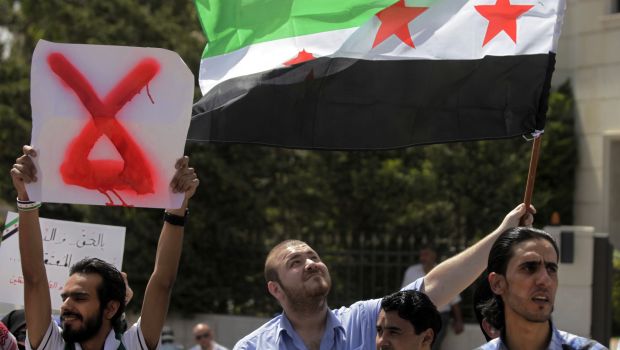
Syrian protesters wave the opposition Syrian flag and a placard in Arabic that reads, “no,” during a protest against the Syrian presidential elections, as others line up to vote in expatriate voting ahead of the June 3 poll, near the Syrian embassy in Amman, Jordan, Wednesday, May 28, 2014. (AP Photo/Mohammad Hannon)
Speaking to Asharq Al-Awsat on condition of anonymity, a Jordanian official said the activity of the alleged groups “became apparent a few days before the elections and became clearer on election day.”
Syrians resident in Jordan were able to vote in Syria’s forthcoming presidential election at the Syrian embassy in Amman on May 28. Voting is set to go ahead within Syria in government-held territory on June 3, though international observers and the Syrian opposition have dismissed it as a sham designed to bolster the legitimacy of Syria’s embattled President Bashar Al-Assad.
The official said 35,000 voters participated in the Syrian presidential elections in Amman, and that “these could be categorized as members of the Alawite sect, traders, businessmen, students on scholarships, and a small number of hesitant Syrians who participated in fear of reprisals if they decided to return to Syria.”
He added that the group which the Jordanian authorities feared most appeared to be intelligence operatives masquerading as refugees.
He said: “The group, whose numbers have increased recently, do not work and monitor the movement of Syrian refugees, and some [have] managed to register with the UNHCR and receive financial aid.”
The official’s comments follow an announcement in Jordan of strict measures to stop Syrians entering through airports and official land border points unless they are transit passengers, registered as refugees with the UN High Commission for Refugees (UNHCR), or hold residence visas for Jordan or other countries such as Lebanon, Turkey or Iraq.
A security official at Jordan’s Jaber border crossing said the numbers of people crossing the border in both directions had been falling thanks to the new measures and the current security and military situation in Syria.
The Jordanian government estimates that there are currently 1.4 million Syrian refugees in the kingdom, including 650,000 who are registered at the UNHCR, with the remainder living in Jordanian cities.

After checking out a few of the blog posts on your web site, I honestly appreciate your way of writing a blog.
I book-marked it to my bookmark website list and will be checking back soon. Please visit my web site as well and tell me how you feel.